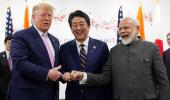During Abe's tenure, Japan had announced support for a number of major projects.
These included the bullet train project between Mumbai and Ahmedabad, besides allocations for a freight corridor between Mumbai and New Delhi.

Abe Shinzo's second run as Japanese prime minister saw investments account for more than ten per cent of India's overall foreign direct investments (FDI) on more than one occasion. (Abe was prime minister from 2006 to 2007 and again from 2012 to 2020.)
Japan's $1.8 billion investments accounted for 11.2 per cent of India's FDI flows in 2013-14.
FDI inflows from the island nation had a 11.7 per cent share in 2016-17 when investments rose to $4.2 billion.
The post-pandemic period has seen some signs of investments tapering off.
Japan's FDI flows to India were $1.5 billion, according to provisional 2021-2022 Reserve Bank of India data, accounting for 2.6 per cent of the overall inflows (see chart 1).
In March 2022, the new Japanese Prime Minister Kishida Fumio announced $42 billion worth of India investments over the next five years.
During Abe's tenure, Japan had announced support for a number of major projects.
These included the bullet train project between Mumbai and Ahmedabad, the cost of which was pegged at $17 billion in 2017, besides allocations for a freight corridor between Mumbai and New Delhi.
A government-backed aid entity, the Japan International Cooperation Agency (JICA), has made multiple investments in the last few years.
An analysis of JICA data shows average commitments of over 348 billion Japanese yen a year since 2013-2014 -- the year from which disbursement data is also available.
Disbursement has averaged around 216 billion Japanese yen a year. One billion yen is around $7 million at the current exchange rate.
It has exposure to around 70 projects a year on average since 2013-14 (see chart 2).
The pre-pandemic trade between the two nations was around $17.63 billion in 2018-2019.
This included India importing $12.77 billion and exporting $4.86 billion.
India's primary exports included petroleum products and chemicals, besides clothing and accessories.
India imported goods including iron and steel products and machinery.
Japan accounted for around Rs 1 trillion in total foreign portfolio assets under custody in June 2022.
It is India's ninth-largest investor. It had a similar rank in January 2012.
Total assets under custody, however, were Rs 16,053 crore (Rs 160.53 billion).












